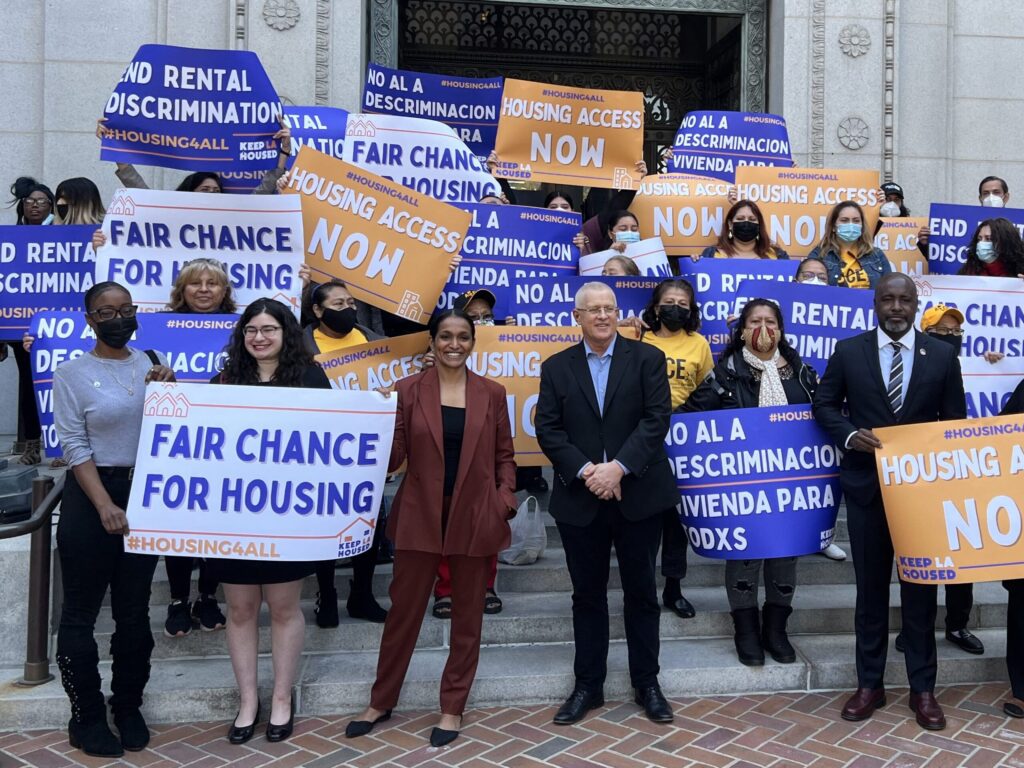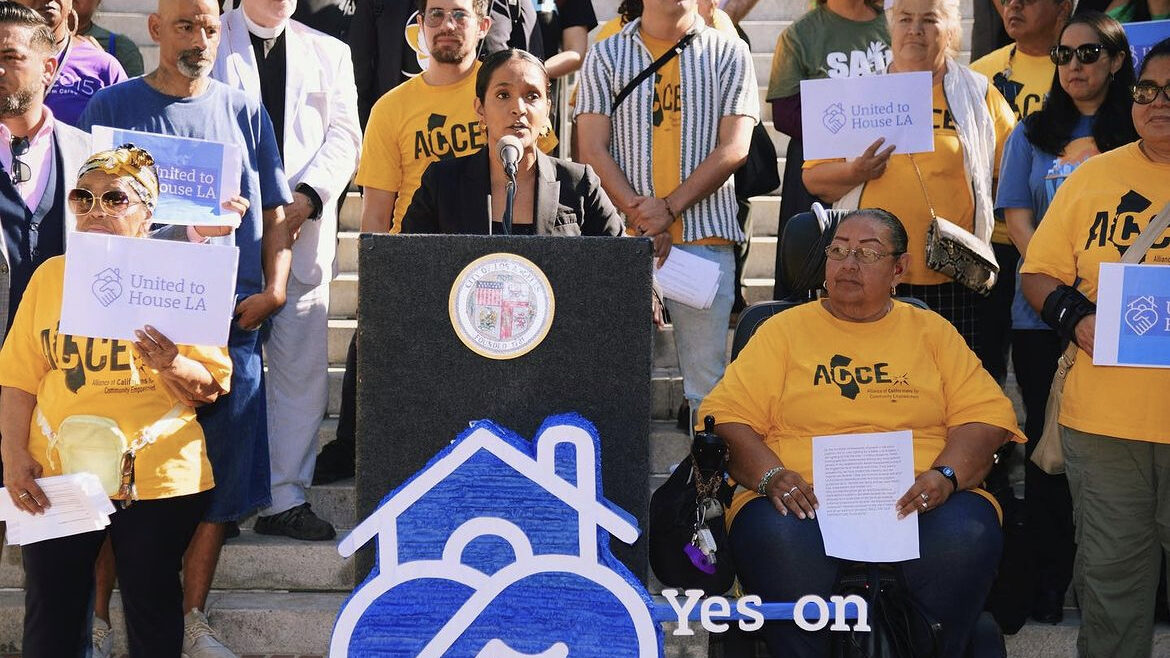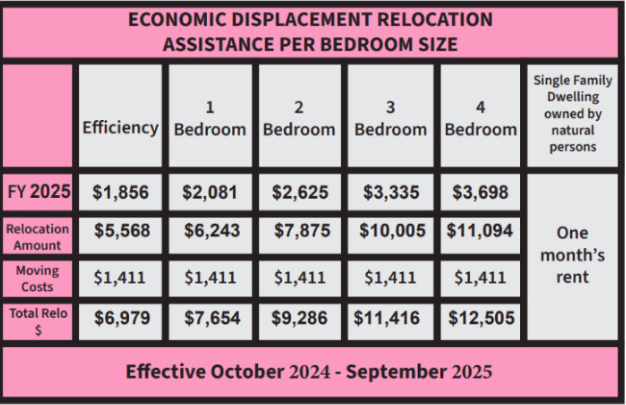DISTRICT 4 Initiatives
Renters Rights & Protections
Last Updated: March 3, 2025
Do you rent your home in the City of Los Angeles? As renters — or, tenants — you have rights and protections against certain rent increases, evictions, and more.
The landscape is constantly changing, and it can be confusing to know what protections apply to you — but we’re here to help.
County Passed New Eviction Protections for Fire-Impacted Renters
On February 25, 2025, Los Angeles County passed a resolution to enact limited eviction protections for workers and small business owners impacted by the 2025 Los Angeles County Eaton and Palisades fire and windstorm events. It applies countywide, including all 88 cities and unincorporated areas.
Landlords are prohibited from evicting most tenants affected by the fires for the next six months, with exceptions for high income renters. To qualify, tenants must submit a self-certification form confirming they have lost at least 10% of their income to their landlord or landlord’s agent within 7 days of each month their rent is due, or within 7 days after the resolution going into effect for rent due in February 2025. Those who receive protection under this resolution must repay any owed rent by July 31, 2026, or risk eviction.
To learn more about this protection, click here.
LA County Household Relief Grant
The LA County Household Relief Grant provides immediate financial assistance to Los Angeles County residents who have been directly impacted by the 2025 Los Angeles County Eaton and Palisades fire and windstorm events. This Program bridges financial gaps and promotes the general welfare of affected households until insurance or government recovery resources become available.
You may be eligible if you’re a resident displaced by the 2025 Eaton and Pacific Palisades fire, with criteria including complete or severe damage to your home, or a related death. The full list of eligibility requirements can be viewed here. Priority be given to the most impacted households based on need, including insurance status, social and economic vulnerability, loss of life, health conditions, and other risk factors.
Eligible households can receive grants in the amount of $6,000, $12,000, or $18,000 depending on household size and composition.
The application period opens on February 26, 2025 and closes on March 12, 2025.
To apply for the LA County Household Relief Grant, click here.
The Los Angeles Housing Department (LAHD) has also put together a list of resources available for those impacted by the wildfires here.
United to House Los Angeles Income Support Program (ULA ISP)
The ULA ISP was created to provide financial assistance to eligible households that include low income seniors and/or people with disabilities who are at-risk of being displaced from their homes. To be eligible for this program, your household must rent in the City of Los Angeles, have at least one household member who is disabled or 65 years of age or older, and your 2023 household income must be at or below 50% of the Area Median Income (AMI).
Only in-progress senior and disabled ULA Emergency Renters Assistance Program (ULA ERAP) applications will be contacted to participate in the ULA ISP program. New applications will not be accepted at this time.
To learn more about this program click here.
Tenant Anti-Harassment Ordinance (TAHO)
IMPORTANT NOTICE!
The tenant anti-harassment ordinance recently went through some changes.
There were a number of substantive amendments to the TAHO ordinance that have been updated such as clarifying exactly what harassment means, ensuring that landlords have to accept rental assistance payments being made by the city, and changing language from tenants from MAY receive compensatory damages to tenants SHALL receive compensatory damages.
You can read more about these changes on LAHD’s website.
What To Do If You Are Experiencing Harassment From Your Landlord
Tenant harassment can take many forms, including refusal to complete required repairs, threatening physical harm, or asking about immigration status.
*To see a full list of what qualifies as renter harassment in the City of LA, click HERE.
Reach out to:
- The LA Housing Department who investigates harassment complaints for RSO units.
- Housing Rights Center investigates harassment complaints for non-RSO buildings.
- Connect with legal assistance such as Coalition for Economic Survival. Find a list of legal resources here.
- Contact your Council Office. Council District 4 residents can reach out to contactCD4@lacity.org or call (213) 473-7004.

Rent Increases
In the City of Los Angeles, rent increases vary depending on what type of unit you rent. Please see below to accurately determine what your allowable rent increase is.
If you are living in a Rent Stabilization Ordinance (RSO) unit:
- You CAN receive an allowable rent increase of up to 4% in a 12-month span, from July 1, 2024 to June 30, 2025.
- An additional 1% for gas and 1% for electricity can be added to the 4% if your landlord provides these services.
- Your landlord is required to give you a 30-day written notice.
- You CANNOT be evicted without a reason or just cause.
- Helpful tip: to find out if you live in an RSO unit, click HERE!
- Look under the Housing tab and the RSO status will be indicated for the property.
If you are living in a non-RSO unit:
- If you are living in a non-RSO unit:
- To see if you’re protected under AB 1482, visit HERE.
- You CAN receive a rent increase. If your unit is protected under State Law AB 1482, you cannot receive an increase of more than 8.9% of your current rent in a 12-month span, from August 1, 2024 to July 31, 2025.
- Your landlord is required to give you a 30-day written notice.
- To see if you’re protected under AB 1482, visit HERE.
- You CANNOT be evicted without a reason or just cause.
NEW RENTER PROTECTIONS
The City Council implemented the most extensive tenant protections seen in more than 40 years, following the Rent Stabilization Ordinance.

Universal Just Cause
*All* units in LA now officially have “just cause” protections, meaning a landlord cannot evict a tenant without declaring a cause from a designated list, which you can find HERE.
For non-RSO units, these protections take effect after six months or at the end of the first lease term, whichever comes first. If you have already been in your apartment for six months as of today, you are covered.
Landlords will be responsible for paying an annual Just Cause Enforcement Fee of $31.05 to the Los Angeles Housing Department (LAHD).
Terminate Tenancy/Eviction Filing Requirements
If you receive an “at-fault” eviction notice, your landlord must file with LAHD within three business days, including legal reasons for eviction.
For all no-fault evictions, landlords must file with LAHD, submit required fees, and pay the tenant relocation assistance.
Evictions for Non-Payment of Rent
City Council approved a minimum threshold for evictable rent debt, which means tenants who owe less than one month of rent CANNOT be evicted.
The threshold is one month Fair Market Rent – currently $2,081 for one-bedroom units and $2,625 for two-bedroom units in Los Angeles. Please refer to LAHD’s website for full information. For example: If a tenant rents a 1-bedroom unit and owes $1,500, the landlord cannot evict the tenant because the rent owed is less than the FMR for a 1-bedroom unit ($2,081).

Economic Displacement (More than 8.9% Rent Increase)
Tenants who receive a rent increase of more than 8.9% (from 8/1/2024 to 7/31/2025), within a 12-month period and unable to afford the rent increase have the option to receive relocation assistance to move out of their rental unit instead. Relocation amount is based on the bedroom size of the rental unit. For example: Tenants who rent a Single Family Dwelling (SFD) is one month’s rent if the landlord is a natural person who owns no more than four (4) residential units and an SFD on a separate lot in the City of Los Angeles.
You can see more detailed information on the exact amounts on LAHD’s website.

Protections Notice
All landlords of residential properties must provide a Notice of Renters’ Protections to tenants who begin or renew their tenancy. This notice must also be posted in an accessible common area of the property.
Click HERE to download the Protections Notice.
STEPS TO TAKE IF YOU RECEIVE AN EVICTION NOTICE
1. DO NOT SELF-EVICT
Stay in your unit and reach out to the City immediately to help navigate what your options are.
2. Identify what kind of notice you received.
Here is a breakdown of common types of notices:
- 3-DAY NOTICE TO PAY OR QUIT: If you receive a 3-day notice you are not required to file an answer and should reach out to LAHD because landlords are required to file to the department. In order for the eviction process to be initiated after a 3-day notice, you will still need to receive a “Summons and Complaint – Unlawful Detainer (UD)”. You should not self-evict if you receive a 3-day notice. Please be on the lookout for a UD, which does have a ten-day deadline to respond.
- UNLAWFUL DETAINER (UD): If you receive a “Summons and Complaint – Unlawful Detainer” you MUST file an answer within10 days. If you respond late you can automatically lose your case. You should not self-evict if you receive an UD, but it is important that you read all notices very carefully and seek legal advice. Please be attentive to any deadlines.
- Please reach out to the Mayor’s LA Fund at 213-584-1808 as they can help you respond to the court and help with any legal representation/advice.
- ANY OTHER TYPE OF NOTICE: Please refer to LAHD resources. If you live in an RSO unit, file an RSO complaint in order to get an RSO investigator to review the case and to create a paper trail for the City. The State of California also has a helpful breakdown of these processes and explanations of different types of eviction notices.
*Reminder: If you don’t respond to formal notices such as “Summons and Complaint – Unlawful Detainer,” you can automatically lose your case. The court eviction process can take 30 days or longer, providing time to access additional resources available to you.
3. Reach out to the Mayor’s LA Fund hotline at 213-584-1808
- We Are LA, an initiative of the Mayor’s Fund for Los Angeles, is focused on preventing evictions and connecting families to resources that can help them stay in their homes.
- If you received a UD, call the Mayor’s LA Fund hotline for help 213-584-1808 or visit their website HERE .
- Please review their resources on what steps to take and refer to a list of other resources such as the Tenant Power Toolkit, Eviction Defense Network’s comprehensive video series, and workshops and clinics hosted by a variety of community-based organizations.
4. Contact your Council Office
If you have questions or concerns, please reach out to your council office as they can help assist you. Council District 4 residents can reach out to contactCD4@lacity.org or call (213) 473-7004 for assistance.
ADDITIONAL INFORMATION & RESOURCES
More information on the City’s Renter Protections:
Legal Resources for LA City Renters:
Help prevent Angelenos from falling into homelessness through outreach, case management and expanded legal services. Contact them by calling 213-584-1808.
Stay Housed LA is a partnership between the City of Los Angeles, Los Angeles County, and local community and legal service providers. The Stay Housed LA website explains current renter protections, hosts renter workshops, and refers renters facing eviction to legal service providers.
Neighborhood Legal Services Of Los Angeles County:
NLSLA offers free legal representation, advice and education to combat poverty in our community.
Los Angeles Housing Department Legal Resources:
List of agencies providing a variety of assistance on landlord/tenant issues, rent stabilization, code enforcement, housing matters, and evictions.
Los Angeles Tenants Union Locals:
The LA Tenants Union is a diverse, tenant-led movement. Locals organize against landlord harassment, mass evictions, and displacement.
Coalition for Economic Survival (CES) Renters’ Rights Clinics:
CES hosts weekly virtual clinics to advise on COVID protections, evictions, rent control, getting repairs, security deposits, and more.
The Tenant Power Toolkit is a collaborative effort between The Debt Collective, The LA Tenants Union, The Anti-Eviction Mapping Project, anti-eviction lawyers and legal service providers. The toolkit has a step by step on how to respond to an unlawful detainer and even submits it for you. The toolkit is designed to keep people in their homes, fight evictions, fight rent debt, and build the collective power of tenants.
California Courts Self-Help Guide:
The State offers a clear breakdown of the eviction process for tenants, including step-by-step guides for how to represent yourself in court
Eviction Defense Network Video Series:
Comprehensive series covering EDN’s Tenant Empowerment Program intended to prepare people for more in-depth webinars and resources.
File an RSO or Just Cause Eviction Protection Complaint:
Reasons for complaint may include the following:
- Unit not registered
- Illegal Eviction
- Non-Payment of Relocation Assistance
- Illegal Rent Increase
- Reduction of Services
- Failure to Post Notice
- Illegal Buyout Agreement
- Required Online Payment/Electronic Fund Transfer
- Harassment
- Issues such as discrimination, retaliation, habitability, or return of security deposits
Report a code violation:
Reasons for complaint may include the following:
- Leaking shower
- No hot water
- Broken countertop
- Flooding
- Issues regarding unsafe living conditions and code violations at multifamily rental properties
- Doesn’t need to be RSO or AB1482. Any apartment complex needs to file a complaint with LAHD (LADBS is responsible for investigating any complaints filed in condominiums)
*Please note: LADBS is responsible for investigating any complaints filed in condominiums and non-RSO buildings.